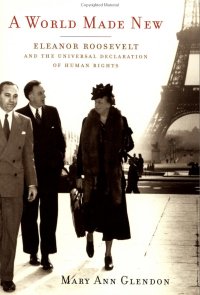Mary Ann Glendon’s ‘A World Made New’
 Acclaimed Harvard legal academic Mary Ann Glendon's A World Made New: Eleanor Roosevelt and the Universal Declaration of Human Rights (Random House, New York 2001) is a great read for anyone with more than a passing interest in human rights. It does what good history writing should do: help us understand where we are today. Written just before the geopolitical shift of 2001, Prof. Glendon offers an account of the genesis of the Universal Declaration of Human Rights — that seminal document of the modern human rights era.
Acclaimed Harvard legal academic Mary Ann Glendon's A World Made New: Eleanor Roosevelt and the Universal Declaration of Human Rights (Random House, New York 2001) is a great read for anyone with more than a passing interest in human rights. It does what good history writing should do: help us understand where we are today. Written just before the geopolitical shift of 2001, Prof. Glendon offers an account of the genesis of the Universal Declaration of Human Rights — that seminal document of the modern human rights era.
Scholarly yet surprisingly pacy, Glendon's book covers the key events and debates of 1946-48 that led to the final, unanimous vote one late night in Paris, now celebrated as Human Rights Day on 10 December. What in lesser hands could have been a turgid wade through transcripts and minutes of committee meetings, is instead absorbing, almost nail-biting.
A World Made New is further enlivened with intimate, at times amusing detail, along with portraits of the key players, beyond the much-admired US First Lady of the subtitle to Lebanon's remarkable Charles Malik, French patriot and Zionist René Cassin and cultured Chinese philosopher Peng-Chun Chang and others.
Like Glendon, Roosevelt was a devout CatholicEpiscopalian. Her son Elliott records her nightly prayer, uttered kneeling in her 'old blue robe', reflecting her personality and outlook on life. Eleanor Roosevelt was not one who expected God to fix things:
"Our Father, who has set a restlessness in our hearts and made us all seekers after that which we can never fully find, forbid us to be satisfied with what we make of life. Draw us from base content and set our eyes on far-off goals. Keep us at tasks too hard for us that we may be driven to Thee for strength.
"Deliver us from fretfulness and self-pitying; make us sure of the good we cannot see and of the hidden good in the world. Open our eyes to simple beauty all around us and our hearts to the loveliness men hide from us because we do not try to understand them. Save us from ourselves and show us a vision of a world made new."
All the while accessible to a non-legal audience, Glendon takes readers on a 'tour' through the final version of the Declaration, offering considered assessments of its shortcomings. She reminds us why the Universal Declaration — nearly 60 years old — is still so important and how it has been, at times, distorted. She explodes some myths and misconceptions about it (it was not Roosevelt, for instance, who insisted on gender-inclusive language, but that other distinguished woman associated with the Declaration, Hansa Mehta of India), while making a strong case for its genuine universality.
Understanding the Universal Declaration's history is critical to appreciating fully this landmark document, the likes of which we may never see again.

I noticed this book in the bibliography of your book (which incidentally I enjoyed reading very much) and made a mental note that I would have to track it down. Now you’ve reinforced that mental note. BTW, the work of good historians is NEVER “a turgid wade through transcripts and minutes of committee meetings”!
Of course. But I spare a thought for the poor historians doing the wading prior to distillation into gripping prose.
I wasn’t sure what you’d think of ‘good history writing should help us understand where we are today’. Perhaps, like science, there’s a place for history for it’s own sake? Or does the study of human history inevitably shed light on the present?
Both. There is a place for history for its own sake, but it has that place because it does shed light on the present and on who we are now by illuminating who we were or were not. I think it has that effect even if we are learning about something that seems to have no immediate relevance to life today – like the religious life of the ancient Egyptians or the myths written about King Arthur in medieval Europe. History is about human beings and how they relate to each other and understand their world, and since we are still human beings who relate to each other and search for ways of understanding our world we can learn from the past. It is John Donne’s “Any man’s death diminshes me, because I am involved in mankind”.
One correction: Eleanor Roosevelt was a lifelong Episcopalian. She was often confused why people would think she was Roman Catholic.
Have a great day.
Thank you for bringing this to my attention. Indeed, she was accused of being anti-Catholic!